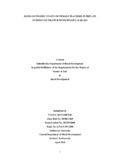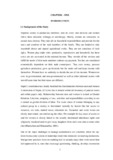Please use this identifier to cite or link to this item:
https://elibrary.tucl.edu.np/handle/123456789/2216| Title: | Socio- Economic Status of Female Teachers in Private Schools of Tikapur Municipality, Kailali |
| Authors: | Shethi, Yagya Man |
| Keywords: | female teachers contribution;Socio-economic status;private school |
| Issue Date: | Apr-2018 |
| Publisher: | Faculty of Rural Development |
| Abstract: | Socio-economic status of female teachers in private schools is satisfactory in terms of their monthly salary because majority of the respondents monthly income ranges form 12,000 to 14,000 which is average income for their household chores in terms of equality between male and female, there is still discrimination on them. By teaching profession most of the respondents i.e. 55% were partially satisfy and of the total respondents, 34 want to shift themselves in other jobs such as civil service, lecturing on college, foreign countries, business and so on. Main obstacles of teachers in school was low salary, lack of cooperation and working environment and others. High proportion of the respondents i.e. 27.5% were involved in teaching profession for their economic independency because in patriarchal society capital is the root cause of domination as Marxist feminist Bryson believes, which gives the clue that Nepalese educated women are aware of their situation. Women's involvement in decision making spheres is good but unfortunately their involvement was ceremonial. Although, women are taken part in different decision making programmes, such as making teaching routine, extracurricular activities, annual operation calendar in majority but while conducting serious types of meetings such as school management committee, taking part in training and workshop, implementation of course and course book, making fee structure, and dress was in minority. By this fact it can be concluded that there is still discrimination between male and female in terms of decision making level. In terms of household management with respect to economic and education spheres majority of the female teachers i.e. 57.5% were applied their salary in family welfare. Of the respondents only 22.5% were involved in every spheres of decision of household chores such as, buying/selling, celebration of festivals and marriage ceremonies too. Majority of the respondents i.e. 55% were not borrowed loan and 35% were lending money which indicates positive socio-economic condition due to employment. Majority of the respondents i.e. 72.5% were made adjustment between household work and school, it means females teachers involved in teaching field were more labourieres in terms of their dual work. v 7 In conclusion, the condition of female teacher in private school is satisfactory. To uplift their status in the society equality in terms of salary, dignity, decision making spheres, their actual presence is necessary rather ceremonial attendance. In household spheres, female teachers contribution is good therefore they should provide equal recognition in household affairs. |
| URI: | http://elibrary.tucl.edu.np/handle/123456789/2216 |
| Appears in Collections: | Rural Development |
Files in This Item:
| File | Description | Size | Format | |
|---|---|---|---|---|
| cover (1).pdf | 609.12 kB | Adobe PDF |  View/Open | |
| CHAPTER.pdf | 1.01 MB | Adobe PDF |  View/Open |
Items in DSpace are protected by copyright, with all rights reserved, unless otherwise indicated.
